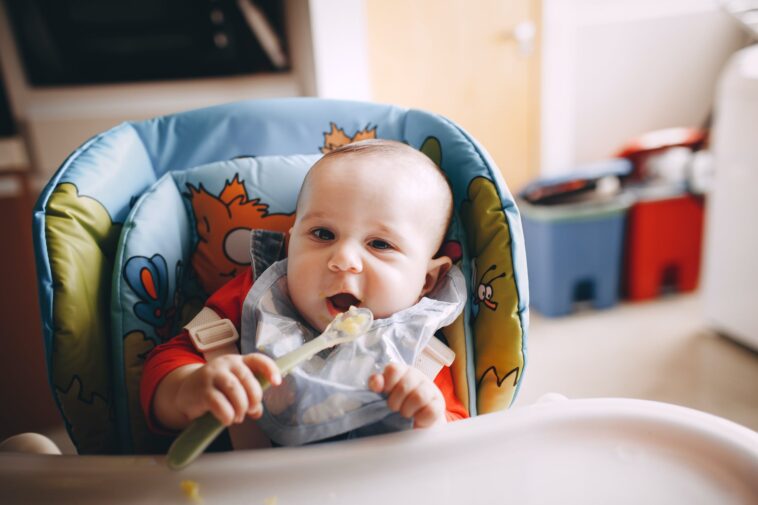There are a number of minor ailments that can appear in babies, and although most of them can be treated quite easily, it often confuses young parents.
1. Baby’s restlessness and colic

At certain times of the day, many babies may behave restlessly, crying loudly and experiencing discomfort. This condition is often associated with colic, which usually occurs after dinner and in the evening. Colic is an episode of acute abdominal pain in babies with an immature digestive system in the first six months of life.
As a rule, colic begins at the first 3-4 weeks, and these are short episodes of 20-30 minutes, then their duration may increase. Colic is one of the most frequent problems in babies of the first year of life, especially worrying parents. The main thing is not to worry, infant colic does not cause any negative consequences in the baby’s health, and your anxiety can be transmitted to the baby!
Usually, babies outgrow this condition, and colic gradually decreases by 3 to 5 months. Since the causes of colic are unknown, its treatment is difficult and usually comes down to simply soothing the baby and massaging.
If you breastfeed your baby, pay attention to your diet. Exclude from your diet highly allergenic products and products contributing to increased gas. Pay attention to the baby’s feeding schedule, and avoid overfeeding.
2. Regurgitation

Regurgitation after feeding is common in babies in the first 6 months of life. In most cases, regurgitation is a functional disorder that passes as the baby grows after 6-8 months of life. Frequent regurgitation in infants is due to the structure of the esophagus and stomach, swallowing air during feeding, violation of feeding regime.
Usually, a baby regurgitates a small amount of stomach contents in a short period after feeding. If the regurgitation is abundant and persistent, it may affect the growth and development of the baby, so it is better to see a pediatrician in such a case.
3. Reflux or acid reflux

Reflux is the return of contents from the stomach into the esophagus and then into the mouth. A variety of reasons causes reflux, but in infants, it is more often caused by a functional disorder of the digestive system.
Generally, acid reflux, or gastroesophageal reflux disease, is not dangerous and goes away by 18 months of age. However, parents are often nervous when their baby suffers from this condition. Lifestyle changes and medical care can help your child cope with acid reflux.
Before making any changes, observe your baby and find out if he or she is experiencing acid reflux. The following symptoms show acid reflux in newborns:
- Rejection of food
- Difficulty eating and swallowing
- Irritation while eating
- Burping or hiccups with fluid secretions
- Weight loss
3. Constipation

Delayed or difficult defecation is called constipation. In this case, the stool becomes harder, which can cause discomfort when emptying. Constipation in a newborn is a really common problem, but it is important to consider individual differences. For example, if one baby soils six diapers a day and another barely a couple, it’s not necessarily a disorder. Stool frequency in babies varies with age and diet.
Signs of constipation in babies are the absence of defecation for two or three days beyond the usual and difficulty or pain when emptying the bowels. But these symptoms are easier to identify in older children who can say they are in pain. As long as your baby feels well, you have nothing to worry about. The frequency and color of the stools may change after introducing complementary foods.
Proper nutrition is the key to the health of your little one!
When your baby is constipated, one of the most critical steps is:
- the diet correction;
- introducing extra fluids into the diet;
- introducing dietary fiber;
- If your baby is breastfed, you need to pay more attention to your diet;
- If your baby is both on mixed and formula feeding, it is possible to introduce a special Comfort formula. Check more options of special baby formulas on organicsbestshop.com
4. Diarrhea
Diarrhea is one of the most common digestive problems in babies. It is loose and watery stools that differ from normal bowel movement in color and consistency. And it is especially important to know these differences because it is normal for babies to have rather liquid stools when breastfeeding.
Diarrhea can be caused by poisoning, severe allergic reactions, and various gastrointestinal disorders. Diarrhea in a baby is a reason to pay attention to the baby’s general health condition and nutrition. Diarrhea happens quite often in babies, especially during teething.
If your baby’s diarrhea persists, see a doctor. It can be dangerous to give your baby diarrhea without the doctor’s prescription first. Self-treatment can lead to suppression of intestinal activity!
5. Vomiting

Vomiting occurs quite often in children of all ages, but it is more prevalent in babies. Children and babies can vomit for a variety of reasons: viral infection, food poisoning, overeating, hypersensitivity. In young children, it is most often a consequence of overfeeding.
Such vomiting occurs suddenly: it is not preceded by nausea, the child’s facial features and behavior do not change. However, vomiting can be a sign of serious illness. When a baby has a fever, diarrhea, or signs of dehydration at the same time as vomiting, parents should immediately see the doctor.
6. Food allergies in babies

A food allergy in a baby is when the body reacts to one or more foods. During an allergy reaction, the immune system accepts proteins or other substances in food not as beneficial but as very dangerous and harmful. The immune system immediately builds a defense against the “enemy” by producing antibodies.
Each baby’s body and immune system are individual, so it is challenging to predict the child’s reaction to the product. But some products still cause a reaction more often than others.
Allergy to cow’s milk protein is the most common food allergy in babies’ first year of life. Breastfeeding is the best way to feed your baby during the first months of life and is preferred whenever possible. Therefore, if the mother is breastfeeding, it is recommended to eliminate foods containing cow’s milk protein from the mother’s diet as a first step.
Suppose these measures do not eliminate the symptoms of the allergy. In that case, the doctor should recommend a formula based on highly hydrolyzed milk protein. In most cases, allergy to cow’s milk proteins goes away in babies after 12 months.





